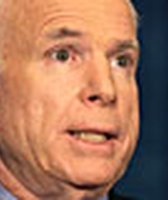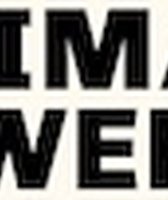Stand up for the facts!
Our only agenda is to publish the truth so you can be an informed participant in democracy.
We need your help.
I would like to contribute
McCain has a mixed record on fuel economy standards
Even though gas prices are (finally!) dropping, voters are still focused on energy, and so is presidential candidate Barack Obama. In his acceptance speech, the Democratic nominee painted Republican opponent John McCain as an opponent of energy efficiency and alternatives to oil.
"Washington's been talking about our oil addiction for the last 30 years, and by the way John McCain has been there for 26 of them," Obama said. "In that time, he has said no to higher fuel-efficiency standards for cars, no to investment in renewable energy, no to renewable fuels."
In a recent item, we examined a similar statement that Obama made earlier this month. We found that Obama was right in noting that McCain had voted against renewable fuel standards and that McCain had voted against tax breaks for producing electricity from wind.
But we also pointed out that McCain hasn't been completely opposed to renewable energy. You can read our analysis here. This time, Obama adds a different claim — that McCain has said no to higher fuel-efficiency standards for cars.
Last year, Congress passed the first increase in fuel-efficiency standards in decades. McCain missed the final vote in December 2007 and missed other votes in June on the issue.
Sign up for PolitiFact texts
In 2005 and in 2003, McCain voted against an amendment that would have increased fuel-economy standards on a set timetable. At the time of the 2005 vote, McCain declared himself a supporter of higher standards, but also said the amendment "does not appear to be achievable without significantly and detrimentally affecting our economy."
The Obama campaign also points to McCain's vote against a 2002 energy bill that would have directed the National Highway Traffic Safety Administration to set new standards for Corporate Average Fuel Economy (CAFE).
But that was a watered-down version of a bill that would have increased the standards through legislation, instead of directing National Highway Traffic Safety Administration to do it. A month earlier, the Senate voted on a motion by Michigan Sen. Carl Levin (a friend of the auto industry) to strike the increase in standards and replace it with the weaker language. McCain was one of just six Republicans who voted no, along with a majority of Democrats.
Featured Fact-check
In fact, McCain and Democrat John Kerry were the driving forces behind the tougher language. "One of the stated objectives of this new energy policy is to reduce America's dependence on foreign oil," McCain said before the final vote on a bill that also had other provisions he objected to. "Regrettably, we missed a critical opportunity when the Senate rejected a proposal to increase fuel efficiency standards, which would have substantially decreased our nation's dependence on foreign oil and also reduced greenhouse gas emissions."
But don't take it from us or John McCain. Here's what Massachusetts Democrat Ted Kennedy said on the Senate floor that day before voting no: "But I think this bill doesn't do enough to ensure that efficiency is a serious component of our energy policy. I commend Senators Kerry and McCain for their efforts on fuel economy standards, but I'm very disappointed in the vote on CAFE."
Obama makes it sound as though McCain opposed raising fuel-economy standards for cars, and there are votes to support that claim. But in 2002, McCain not only wanted tougher standards than most of the Senate did, but he was lauded by a Democratic colleague. Obama gives a misleading picture of a senator who has been a notable advocate of higher fuel efficiency standards. We rate the claim Barely True.
Editor's note: This statement was rated Barely True when it was published. On July 27, 2011, we changed the name for the rating to Mostly False.
Our Sources
U.S. Senate, Roll Call Vote 430, Dec. 13, 2007. Accessed on Aug. 28, 2008
U.S. Senate, Roll Call Vote 225, June 21, 2007. Accessed on Aug. 28, 2008
U.S. Senate, Roll Call Vote 224, June 21, 2007. Accessed on Aug. 28, 2008
U.S. Senate, Roll Call Vote 209, June 12, 2007. Accessed on Aug. 28, 2008
U.S. Senate, Roll Call Vote 157, June 23, 2005. Accessed on Aug. 28, 2008
U.S. Senate, Roll Call Vote 309, July 29, 2003. Accessed on Aug. 28, 2008
U.S. Senate, Roll Call Vote 94, April 25, 2002. Accessed on Aug. 28, 2008
U.S. Senate, Roll Call Vote 47, March 13, 2002. Accessed on Aug. 28, 2008.
Congressional Record, June 23, 2005 and April 25, 2002
CQ Weekly, Nov. 30, 2002
CQ Almanac for 1986 to 2006
McCain's Senate Office McCain press release on energy bill vote, June 28, 2005
Council on Foreign Relations Obama Youngstown speech, Aug. 5, 2008
Senate Roll Call, Eight billion gallons renewable fuel amendment vote, June 15, 2005
Senate Roll Call, Ten percent renewable energy requirement amendment vote, June 16, 2005
Senate Roll Call, 1992 Energy bill vote, Feb. 19, 1992
Senate Roll Call, 2005 Energy bill vote, June 28, 2005
Browse the Truth-O-Meter
More by Richard Rubin
McCain has a mixed record on fuel economy standards
Support independent fact-checking.
Become a member!
In a world of wild talk and fake news, help us stand up for the facts.



































